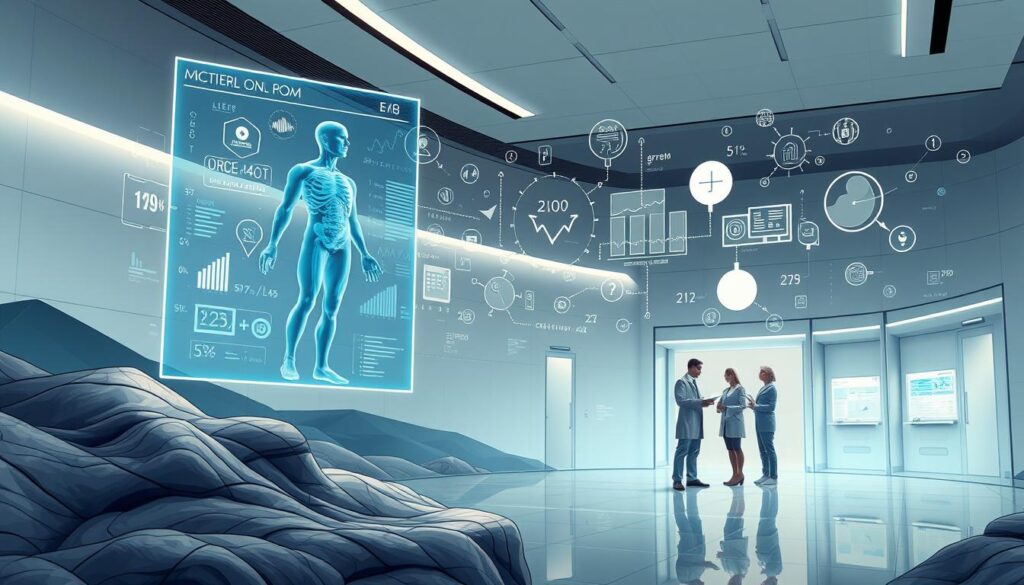Recent studies show that AI can predict health risks with 92% accuracy. This is changing how doctors care for patients. AI in healthcare is a big step forward in preventing diseases, thanks to advanced predictive analytics.
By combining machine learning with medical data, we can find diseases early and tailor treatments. Doctors use AI to look at patient data deeply. This helps them spot health risks before symptoms show up.
Predictive analytics in healthcare does more than just diagnose. AI looks at huge amounts of medical data to find patterns that humans might miss. This gives a better way to manage patient health.
Key Takeaways
- AI predicts health risks with unprecedented accuracy
- Machine learning enables early disease detection
- Personalized healthcare strategies are now possible
- Complex medical data can be analyzed more efficiently
- Preventive care is being revolutionized through predictive technologies
Understanding AI-Powered Health Risk Assessment
Artificial intelligence is changing healthcare in big ways. It’s helping doctors predict and manage health risks better. Now, health profiles are more detailed, thanks to AI, giving us new insights into our health.
AI is a key tool for better healthcare. It looks at lots of medical data to spot health problems early. This helps avoid serious issues later on.
Core Components of Health Prediction
The main parts of AI health risk assessment are:
- Advanced data analysis algorithms
- Machine learning pattern recognition
- Comprehensive genetic and lifestyle data integration
- Real-time health monitoring capabilities
The Evolution of Predictive Healthcare
Healthcare has moved from just treating sickness to using data to predict it. AI can now handle huge amounts of health data with great accuracy.
| Era | Healthcare Approach | AI Involvement |
|---|---|---|
| Traditional | Reactive Treatment | Minimal |
| Current | Predictive Prevention | Comprehensive |
| Future | Personalized Intervention | Fully Integrated |
Key Benefits for Patients and Providers
AI in wellness brings big benefits:
- Early disease detection
- Customized treatment recommendations
- Reduced healthcare costs
- Enhanced patient outcomes
As technology gets better, health profiles will get even more detailed. This will help people take charge of their health.
The Role of Machine Learning in Medical Diagnostics
Machine learning in diagnostics is changing healthcare technology. It’s making it easier for doctors to analyze patient data and make important decisions.
Machine learning can handle huge amounts of medical data fast and right. It finds patterns that humans might miss. This means doctors can spot diseases sooner and more accurately.
- Rapid image analysis of medical scans
- Advanced pattern recognition in patient records
- Predictive risk assessment models
- Enhanced diagnostic accuracy
Machine learning is used in many ways in diagnostics:
| Diagnostic Area | Machine Learning Impact |
|---|---|
| Radiology | 90% accuracy in detecting early-stage tumors |
| Pathology | Faster cellular pattern recognition |
| Genetic Screening | Identifying complex genetic risk factors |
Medical professionals now use advanced AI algorithms to make diagnosis faster and more accurate. This reduces mistakes and improves care for patients. Machine learning is expanding what’s possible in healthcare diagnostics.
How Predictive Analytics Transform Patient Care
Predictive analytics is changing healthcare by how doctors care for patients. It lets them see health risks coming and plan ahead.
Today, healthcare uses advanced predictive analytics to better patient care. It combines health data for more tailored and accurate care plans.
Data Collection and Analysis Methods
Advanced predictive analytics use many data sources for deep health insights:
- Electronic health records
- Genetic information databases
- Wearable device data
- Patient lifestyle information
Real-time Health Monitoring Systems
Health data integration makes constant patient monitoring possible. Smart monitoring systems track vital signs, spot issues, and notify doctors right away.
Predictive Modeling Techniques
Healthcare pros apply advanced predictive models to:
- Spot disease risks early
- Predict how patients will respond to treatments
- Make treatment plans better
- Customize preventive care
By using predictive analytics, healthcare can improve care, cut costs, and boost health results.
AI in Healthcare: Current Applications and Impact
Digital health is changing medical practices with new AI technologies. These technologies show great promise in bettering patient care and making healthcare smoother.
AI in healthcare is used in many ways:
- Diagnostic image analysis
- Predictive patient risk assessment
- Administrative workflow optimization
- Personalized treatment recommendations
Doctors use advanced AI to read medical images better than ever before. Radiological scans can be analyzed faster and more precisely than traditional human-only methods, helping find diseases early.
“AI is not replacing healthcare professionals but augmenting their capabilities to deliver more targeted, efficient care.” – Dr. Eric Topol, Digital Health Research Director
AI’s effects are seen across many healthcare areas, leading to better care and more efficient work:
| Healthcare Domain | AI Application | Potential Impact |
|---|---|---|
| Diagnostics | Image Recognition | 95% accuracy in detecting early-stage conditions |
| Patient Management | Predictive Analytics | 40% reduction in hospital readmission rates |
| Administrative | Workflow Automation | 30% time savings in documentation |
As digital health keeps growing, AI in healthcare will change medicine. It will make care more precise, tailored, and forward-thinking.
Early Disease Detection Through AI Technologies
AI is changing how we find diseases early. It can spot health risks before they get serious. These systems use complex algorithms to look at medical data very closely.
Preventive care algorithms are great at finding small patterns that people might miss. They look at a lot of medical data to find health risks accurately.
Breakthrough Biomarker Analysis
AI’s biomarker analysis is a big step forward in medicine. It can:
- Find tiny changes in biological markers
- Guess how a disease will progress
- Give personalized risk checks
“AI is transforming early disease detection from reactive to proactive healthcare” – Dr. Emily Rodriguez, Stanford Medical Research Center
Screening Protocol Optimization
Machine learning is making screening better. It helps create more focused and effective tests. These systems look at patient data to:
- Make screening plans just for you
- Cut down on tests that aren’t needed
- Find people at high risk fast
Using AI for early disease detection helps doctors give better care. It can save lives and lower treatment costs.
Personalized Health Profiles: The Future of Prevention

Artificial intelligence is changing healthcare with personalized health profiles. These digital tools use detailed data analysis to make unique wellness plans for each person. AI in wellness changes how we see health by giving insights that fit each person’s needs.
Personalized health profiles use many data sources for a deep understanding of health:
- Genetic information
- Lifestyle habits
- Medical history
- Real-time biometric data
- Environmental factors
The strength of AI-driven health profiles is in spotting health risks early. They analyze complex data to:
- Find early signs of problems
- Suggest ways to prevent issues
- Offer tailored wellness plans
| Data Type | AI Analysis Capability | Prevention Potential |
|---|---|---|
| Genetic Markers | Risk Assessment | High |
| Lifestyle Data | Behavioral Prediction | Medium |
| Medical Records | Disease Pattern Recognition | Very High |
Healthcare experts can now use these advanced AI profiles to create early, tailored prevention plans. This greatly improves health outcomes for patients.
Risk Stratification and Patient Assessment Methods
Artificial intelligence is changing how doctors assess patient risks. It uses predictive analytics to help doctors create better care plans. This makes care more focused and effective.
Today’s healthcare needs accurate ways to understand patient risks. AI technologies offer advanced methods to check health risks at both individual and group levels.
Population Health Management
Predictive analytics changes how we manage health at a population level. It lets healthcare systems:
- Spot high-risk patients
- Focus on preventive care
- Design specific health programs
- Use resources better
Individual Risk Factor Analysis
AI looks at more than just group data. It creates detailed risk profiles for each person. This includes:
- Genetic risks
- Lifestyle choices
- Environmental factors
- Medical history
Advanced AI models can forecast health risks with high accuracy. This lets doctors create plans tailored to each patient.
Integration of Health Data Systems with AI
Health data integration is a big step forward in healthcare tech. AI is changing how doctors handle and use patient data. This is across many platforms and systems.
Integrating health data systems comes with big challenges:
- Standardizing different medical record formats
- Keeping patient data safe and private
- Building systems that work together
- Creating ways to translate data well
Now, AI can handle complex data mapping and changes. Machine learning algorithms can link different electronic health record systems. This gives doctors a better view of patient health.
Healthcare groups are putting a lot of money into data platforms. These platforms use AI to:
- Bring together patient data from various sources
- Spot complex health patterns
- Make predictions about health risks
- Help tailor treatments to each patient
“The future of healthcare lies in our ability to connect and analyze data intelligently” – Medical Technology Institute
By using health data integration, doctors can get new insights into patient health. This leads to better diagnosis and treatment results.
Preventive Care Algorithms and Their Implementation
Preventive care algorithms are changing healthcare. They help doctors treat patients better. These tools use data to predict health risks early.
Today, healthcare uses smart systems to prevent problems. These algorithms look at many data points. They give deep insights into a person’s health future.
Custom Treatment Plan Generation
AI helps doctors make special treatment plans. They use:
- Comprehensive patient history evaluation
- Real-time health data integration
- Genetic risk factor assessment
- Personalized health profile development
Intervention Timing Optimization
When doctors act early, patients do better. Algorithms help find the best times for:
- Early screening recommendations
- Preventative medication adjustments
- Lifestyle modification suggestions
- Targeted health monitoring
Healthcare pros can now make more precise health plans. They use data to spot health risks early.
Chronic Disease Management Through AI Solutions
Artificial intelligence is changing how we handle chronic diseases. It lets healthcare teams watch and manage long-term health in new ways. AI gives deep insights into patient health, leading to care plans that are more active and tailored to each person.
AI-driven chronic disease management has key parts:
- Real-time patient health monitoring
- Predictive risk assessment algorithms
- Personalized intervention recommendations
- Early warning detection systems
Advanced machine learning looks at lots of medical data. This includes electronic health records, wearable devices, and genetic info. These smart systems spot patterns that might not be seen by doctors.
AI in chronic disease prevention brings big benefits:
- More accurate diagnoses
- Lower healthcare costs
- Better patient results
- Custom treatment plans
Healthcare groups are using AI to make chronic disease management smarter. With predictive analytics, doctors can spot health risks early. This lets them take steps to prevent serious problems.
“AI represents a paradigm shift in how we approach chronic disease management, moving from reactive to proactive healthcare.” – Medical Technology Innovations Journal
AI in wellness is breaking new ground. It offers hope for better, more tailored ways to prevent chronic diseases. This could greatly improve patients’ lives.
Digital Health Transformation and AI Innovation
The digital health transformation is changing healthcare with advanced AI. Artificial intelligence in healthcare is opening new doors for medical innovation and better patient care.
New technologies are making a big impact on healthcare. They are improving diagnosis, treatment, and patient results. AI is changing how doctors tackle tough health problems.
Breakthrough Healthcare Technologies
- Advanced predictive diagnostic algorithms
- Real-time patient monitoring systems
- Personalized treatment recommendation engines
- Automated medical imaging analysis
Future Development Trajectories
The future of digital health looks very bright. AI in healthcare will focus on several key areas:
| Technology Area | Projected Impact |
|---|---|
| Precision Medicine | Hyper-personalized treatment strategies |
| Predictive Health Analytics | Early disease detection and prevention |
| Robotic Surgery | Enhanced surgical precision and outcomes |
“AI is not just transforming healthcare—it’s reimagining what’s possible in medical science.” – Dr. Eric Topol, Digital Health Expert
The ongoing digital health transformation is a big change in medical technology. It offers new chances for better patient care and medical research.
Ethical Considerations in AI Health Predictions

AI in healthcare brings up big ethical questions. It’s great for making medical predictions, but it also raises big concerns. These include patient privacy, data safety, and fairness in AI decisions.
The main ethical worries about AI health predictions are:
- Data privacy and patient confidentiality
- Potential algorithmic bias in medical predictions
- Transparency of AI decision-making processes
- Informed consent for AI-driven healthcare interventions
Experts and healthcare workers need to tackle several big ethical issues. They must make sure AI is used right. They need to protect individual rights while using new tech in healthcare.
| Ethical Dimension | Key Considerations | Potential Mitigation Strategies |
|---|---|---|
| Data Privacy | Patient information security | Robust encryption protocols |
| Algorithmic Bias | Unequal prediction accuracy | Diverse training datasets |
| Transparency | Understanding AI decision processes | Explainable AI frameworks |
Creating detailed ethical rules is key for using AI right in healthcare. Working together, tech experts, doctors, and ethicists can find good ways to use predictive analytics.
Implementation Challenges and Solutions
Digital health transformation is complex for healthcare organizations. They need to integrate advanced AI technologies. This journey requires strategic planning and a comprehensive approach to overcome obstacles.
Healthcare institutions face many challenges when using AI-driven solutions. These challenges include technical, organizational, and human resource issues.
Technical Infrastructure Requirements
For digital health transformation to succeed, a strong technical infrastructure is needed. Key requirements include:
- High-performance computing systems
- Secure cloud storage capabilities
- Advanced data processing networks
- Scalable cybersecurity frameworks
Staff Training and Adaptation Strategies
AI technologies need comprehensive staff development programs. Effective strategies include:
- Customized training curriculum
- Hands-on technology workshops
- Continuous learning platforms
- Mentorship and peer support networks
| Challenge Category | Potential Solutions |
|---|---|
| Technical Infrastructure | Cloud-based systems, modular architecture |
| Staff Readiness | Comprehensive training programs |
| Data Integration | Standardized interoperability protocols |
Successful health data integration needs a strategic and patient approach. It balances technology with human expertise. Organizations must create environments that adapt to digital health transformation while keeping patient care standards high.
Conclusion
AI in healthcare is changing the game, bringing new chances for better patient care. It’s making doctors smarter at stopping diseases and finding treatments. This is a big leap forward in medical tech.
AI’s power goes beyond what we see today. It uses advanced algorithms to guess health risks, helping doctors act early. This could save many lives. Teams at places like Stanford and MIT are exploring AI’s limits in medical diagnosis.
But, there are still big challenges to overcome. Issues like keeping patient data safe, following ethics, and setting up the right tech are major hurdles. Despite these, the benefits of AI in healthcare are too great to ignore, pushing for more research and development.
The future of healthcare and AI looks bright. Doctors and AI will work together more closely. The aim is to make doctors better, not replace them. This partnership will lead to better care and new ways to prevent health problems.




